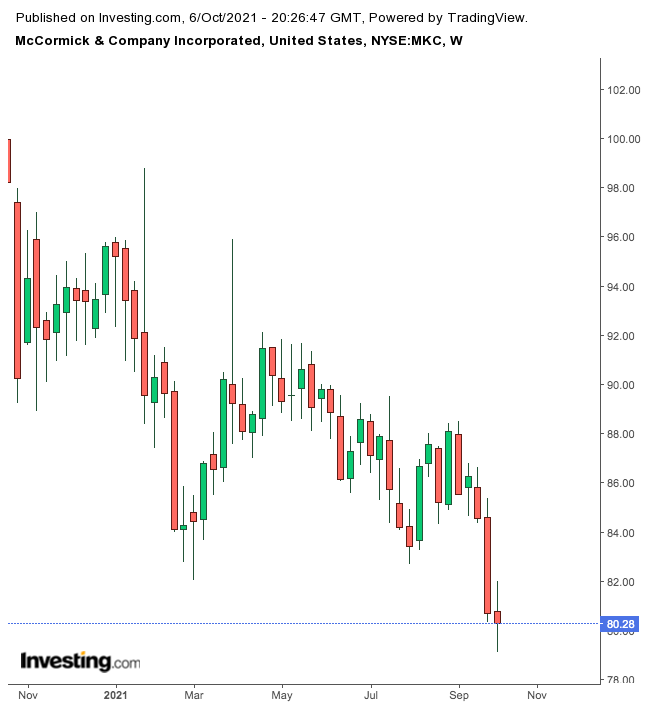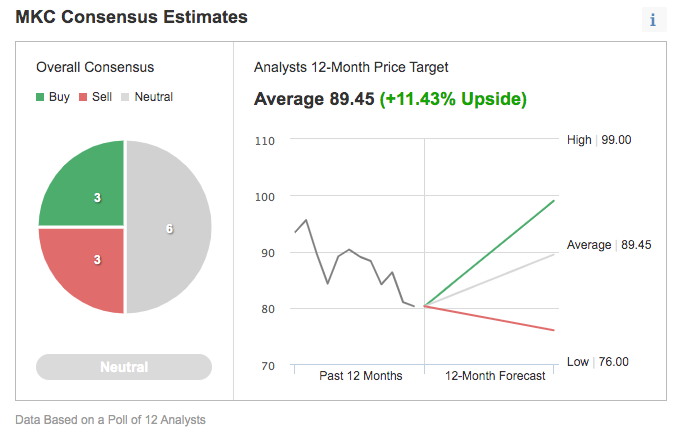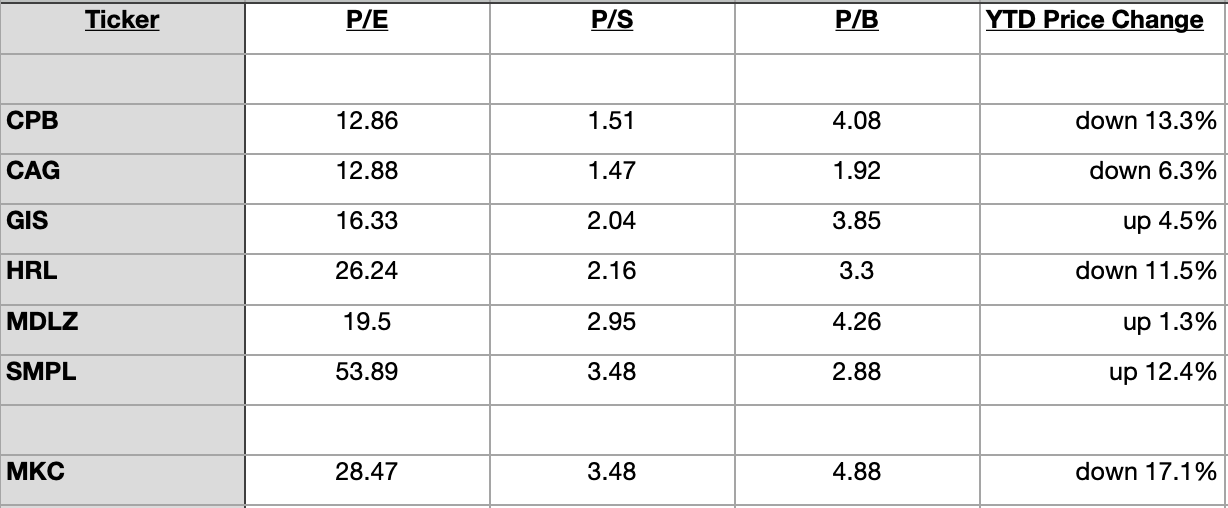- MKC stock is down almost 17% so far in 2021, and saw a 52-week low on Oct. 6.
- McCormick is a juggernaut in the food industry
- Despite potential short-term volatility in the stock, buy-and-hold investors could regard any further short-term decline in MKC shares as an opportune entry point
- Vesper U.S. Large Cap Short-Term Reversal Strategy ETF (NYSE:UTRN): This fund is up 16.01% YTD, and MKC stock’s weighting is 3.86%;
- Invesco S&P 500® Equal Weight Consumer Staples ETF (NYSE:RHS): The fund is up 1.8% YTD, and MKC stock’s weighting is 2.98%;
- ProShares MSCI Transformational Changes ETF (NYSE:ANEW): The fund is up 4.3% YTD, and MKC stock’s weighting is 1.70%.
Investors in the spice and flavoring heavyweight McCormick & Company (NYSE:MKC) have seen their shares lose 16.9% year-to-date. In fact, the stock hit a 52-week low intraday on Oct. 6.
MKC shares closed yesterday at $80.28. The current price supports a dividend yield of 1.7%. Management has increased dividends for more than three decades, making MKC a respected dividend aristocrat.

The 52-week range for shares of McCormick has been $79.11 - $101.67, while the company’s market capitalization stands at $21.4 billion. Readers might be interested to know that the all-time high of $101.67 was hit almost a year ago on Oct. 13, 2020.
Headquartered in the greater Baltimore area, McCormick manufactures and distributes food items like spices, and seasoning mixes. Among its global brands are Billy Bee, Cholula, Club House, Drogheria & Alimentari, Ducros, El Guapo, Galeo, Kitchen basics, Old Bay and others. As an industry leader, MKC stock is widely followed.
What To Expect From MKC Stock
Among 12 analysts polled via Investing.com, McCormick stock has a ‘neutral' rating.
The shares have a 12-month price target of $89.45, implying an increase of about 12.5% from current levels. The 12-month price range currently stands between $76 and $99.

Trailing P/E, P/S and P/B ratios for MKC stock stand at 28.47x, 3.48x and 4.88x, respectively.
We can compare these metrics to those of several other leading names in the food industry, such as Campbell Soup (NYSE:CPB), Conagra Brands (NYSE:CAG), General Mills (NYSE:GIS) Hormel Foods (NYSE:HRL), Mondelez International (NASDAQ:MDLZ) and Simply Good Foods (NASDAQ:SMPL). Their comparable ratios and their YTD price changes are:

Chart: Tezcan Gecgil
During the pandemic lockdown, especially in 2020, most food companies saw robust demand for at-home cooking products. As a result, their share prices reached new highs. But investors have been valuing these stocks differently in 2021.
Now, inflation has been taking a bite out of recent earnings as well as the companies' share prices. Investors have been worried that margins will likely suffer as costs rise.
Readers who watch technical charts might be interested to know that a number of MKC's short- and intermediate-term oscillators are oversold. Although they can stay extended for weeks, if not months, the decline in price could also be coming to an end.
Our expectation is for MKC stock to decline toward the $75 level, where it is likely to find relatively strong support. The shares then could likely trade sideways while it establishes a new base.
3 Possible Trades On McCormick Stock
1. Buy MKC Stock At Current Levels
Investors who are not concerned with daily moves in price and who believe in the long-term potential of the company could consider investing in McCormick stock now.
Yesterday, McCormick stock closed at $80.28. Buy-and-hold investors should expect to keep this long position for several months while the stock makes an attempt at analysts’ price target of $89.45.
The next step would be the record high of $101.67. Such a move would lead to a return of about 26.5% from the current level. Investors should expect to hold this position for several months, if not multiple quarters.
Investors who opt for this approach but are concerned about large declines might also consider placing a stop-loss at about 3-5% below their entry point.
2. Buy An ETF With McCormick As A Main Holding
Many readers are familiar with the fact that we regularly cover exchange-traded funds (ETFs) that might be suitable for buy-and-hold investors. Thus, investors who do not want to commit capital to McCormick shares but would still like to have substantial exposure to the stock might consider researching a fund that holds the company as a top holding.
Examples of such ETFs include:
3. Cash-Secured Put Selling
Investors who believe the decline in McCormick could soon come to an end might consider selling a cash-secured put option in MKC stock—a strategy we regularly cover. As it involves options, this set-up will not be appropriate for all investors.
Such a bullish trade could especially appeal to those who want to receive premiums (from put selling) or to possibly own McCormick shares for less than their current market price of $80.28.
A put option contract on MCK stock is the option to sell 100 shares. Cash-secured means the investor has enough money in his or her brokerage account to purchase the security if the stock price falls and the option is assigned. This cash reserve must remain in the account until the option position is closed, expires or the option is assigned, which means ownership has been transferred.
Let's assume an investor wants to buy McCormick stock, but does not want to pay the full price of $80.28 per share. Instead, the investor would prefer to buy the shares at a discount within the next several months.
One possibility would be to wait for MKC stock to fall, which it might or might not do. The other possibility is to sell one contract of a cash-secured MKC put option.
So the trader would typically write an at-the-money (ATM) or an out-of-the-money (OTM) put option and simultaneously set aside enough cash to buy 100 shares of the stock.
Let's assume the trader is putting in this trade until the option expiry date of Dec. 17. As the stock is $80.28 at time of writing, an OTM put option would have a strike of $75.00. So the seller would have to buy 100 shares of McCormick at the strike of $75.00 if the option buyer were to exercise the option to assign it to the seller.
The MKC Dec. 17 75-strike put option is currently offered at a price (or premium) of $1.23.
An option buyer would have to pay $1.23 X 100, or $123, in premium to the option seller. This premium amount belongs to the option seller no matter what happens in the future. The put option will stop trading on Friday, Dec. 17.
Assuming a trader would enter this cash-secured put option trade at $80.28, at expiration on Dec. 17, the maximum return for the seller would be $123, excluding trading commissions and costs.
The seller's maximum gain is this premium amount if MKC stock closes above the strike price of $75.00. Should that happen, the option expires worthless.
If the put option is in the money (meaning the market price of McCormick stock is lower than the strike price of $75.00) any time before or at expiration on Dec. 17, this put option can be assigned. The seller would then be obligated to buy 100 shares of MKC stock at the put option's strike price of $75.00 (i.e., at a total of $7,500).
The break-even point for our example is the strike price ($75.00) less the option premium received ($1.23), i.e., $73.77. This is the price at which the seller would start to incur a loss.
Cash-secured put selling is a moderately more conservative strategy than buying shares of a company outright at the current market price. This can be a way to capitalize on the choppiness in MKC stock in the coming weeks.
Investors who end up owning McCormick shares as a result of selling puts could further consider setting up covered calls to increase the potential returns on their shares. Thus, selling cash-secured puts could be regarded as the first step in stock ownership.
